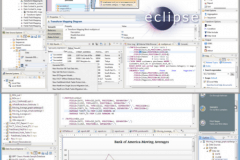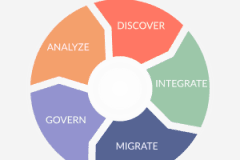
Data Conversion is Liberation
For Data and DB Migration
Unlock the Buiness Value of Application Data
NextForm frees your data, programs, and databases from legacy formats and vendor lock-ins. More data versatility means more usability.
Learn more
Repurpose Your Data
NextForm modernizes file formats so they can be used in new applications. It also replicates DB data, remaps data types and record layouts, and creates federated views to speed insights.
Learn more
Higher Performance & Lower Cost
NextForm also gives you the opportunity to cull data as you move it, speeding I/O and reducing storage. Slash 75% off design and run time with point-and-click field mapping that help you control your data with ease.
Learn more
References
NextForm Use Cases

Fast, Easy File Conversion
"NextForm simply and quickly converts our big LDIF files to custom CSV targets. A 165mb LDIF file converted in seconds, 1+GB in less than a minute. Excellent product!"

COBOL to DB Migration
"NextForm is a fast, cost-effective Vision (and MF-ISAM) file migration and reporting solution. We also like the product's graphical job design and scripting options."

Legacy Data Type Translation
"NextForm converts EBCDIC data files (including zoned and PD fields) to ASCII. As a beginner I was able to make new jobs quickly and determine the output was correct."
NextForm Editions
Lite (Free!)
Includes:
IRI NextForm executable
IRI Workbench (Eclipse GUI)
Migrate, replicate, federate, and report on flat and unstructured text files.
Convert fixed to delimited, LDIF to CSV, EBCDIC to ASCII, big to little endian, etc.
Search, extract, and structure strings in MS documents, emails, PDFs, etc.
DBMS
Includes:
Lite
ODBC Libraries
Replicate, federate, and report against data in any connected table or flat file.
Upgrade your version of - or migrate between - Oracle, PostgreSQL, DB2 UDB, DB2 on i and z/OS, Sybase, MS SQL, MySQL, Teradata, MongoDB, etc.
COBOL (Index)
Includes:
Lite
MF Libraries
Convert MF-ISAM & Vision files, MF & RM data types.
Re-use, and report from, mainframe data sets.
Legacy (Other)
Includes:
Lite
Proprietary Drivers
Migrate and report on data in the legacy formats listed here.
Modern
Includes:
Lite
Proprietary Drivers
Access and use data in big data (e.g., Hive, NoSQL) and cloud/SaaS (e.g., Marketo, Salesforce) repositories.
Premium
Includes:
Lite
Multiple Libraries
Migrate, replicate, federate and report on structured, semi- and unstructured (dark) data.
Supported Sources and Formats
Flat Files
- CSV
- Delimited
- Fixed
- LDIF
- Micro Focus Variable Length
- Micro Focus ISAM
- Line/Rec/Var Sequential
- Variable Blocked
- Text
- Vision
- XML
Data Types
- ASCII (c types)
- Numerics
- EBCDIC MF COBOL
- DBCDIC RM COBOL
- Dates & Time Stamps
- Composite
- Single-Byte
- Multi-Byte (CJK, Thai)
- Unicode
- Packed Decimal
- Zoned Decimal
Legacy
- Adabas
- C-ISAM Informix, D-ISAM
- Datacom
- Dataflex
- dBase
- IDMS
- IMS
- Intersystems
- PostgreSQL
- Powerhouse
- Unidata
RDBMS
- Oracle
- DB2 UDB
- DB2 Mainframe
- MySQL
- SQL Server
- Sybase
- Teradata
Modern
- Amazon EMR, RDS, etc.
- Cloudera CDH & Impala
- Hortonworks Hive
- NoSQL (Cassandra, MongoDB)
- Pivotal (Greenplum, Hive)
- Spark SQL
- Web-based (Eloqua, Hubspot, Marketo, Salesforce, etc.)
Unstructured Files
- ASN.1 TAP3
- .DOC, .DOCX
- .EML, .OST, .PST
- .PDF, .RTF
- .PPT, .PPTX
- .TXT, .XML
- .XLS, .XLSX
AND:
The proprietary/mainframe (legacy) & cloud/SaaS (modern) sources in the 2nd & 3rd sections of this page!
Learn more about NextForm
What Others Are Reading

Examining the LDIF File Format
LDIF is a standard text format for LDAP data in address books, spreadsheets and other structured data sets.

Incremental Data Replication
Use the values in your source columns to automatically move data into new target tables or files.

Filter Data to Reduce I/O
One of the best ways to speed up big data operations is to select only the data that you will need in each target.







